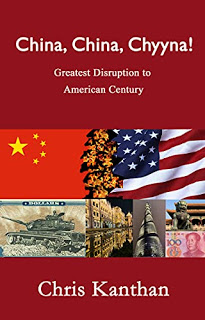Summary:
The book has six long chapters debunking the Uyghur/ Xinjiang myth. Why 100,000+ words in this book to talk about China? First, we are living through a historic geopolitical disruption that happens once every century or so — a rising power is poised to surpass an established hegemon as the largest economy in the world. Mainstream media and experts are living in denial, but China’s GDP will be #1 within five years. Second, the inexorable rise of China and a multipolar world will have profound consequences: end of the American Century and erosion of dollar supremacy. Third, great power rivalry could lead to catastrophic wars.Thirty years ago, most Chinese didn’t have basic home appliances. How did this poor communist country become the world’s #1 manufacturer, largest trading nation, and
Topics:
Mike Norman considers the following as important:
This could be interesting, too:
The book has six long chapters debunking the Uyghur/ Xinjiang myth. Why 100,000+ words in this book to talk about China? First, we are living through a historic geopolitical disruption that happens once every century or so — a rising power is poised to surpass an established hegemon as the largest economy in the world. Mainstream media and experts are living in denial, but China’s GDP will be #1 within five years. Second, the inexorable rise of China and a multipolar world will have profound consequences: end of the American Century and erosion of dollar supremacy. Third, great power rivalry could lead to catastrophic wars.Thirty years ago, most Chinese didn’t have basic home appliances. How did this poor communist country become the world’s #1 manufacturer, largest trading nation, and
Topics:
Mike Norman considers the following as important:
This could be interesting, too:
Robert Vienneau writes Austrian Capital Theory And Triple-Switching In The Corn-Tractor Model
Mike Norman writes The Accursed Tariffs — NeilW
Mike Norman writes IRS has agreed to share migrants’ tax information with ICE
Mike Norman writes Trump’s “Liberation Day”: Another PR Gag, or Global Reorientation Turning Point? — Simplicius
The book has six long chapters debunking the Uyghur/ Xinjiang myth.
Why 100,000+ words in this book to talk about China? First, we are living through a historic geopolitical disruption that happens once every century or so — a rising power is poised to surpass an established hegemon as the largest economy in the world. Mainstream media and experts are living in denial, but China’s GDP will be #1 within five years. Second, the inexorable rise of China and a multipolar world will have profound consequences: end of the American Century and erosion of dollar supremacy. Third, great power rivalry could lead to catastrophic wars.
Thirty years ago, most Chinese didn’t have basic home appliances. How did this poor communist country become the world’s #1 manufacturer, largest trading nation, and the largest market for e-commerce, electric cars, and mobile payments? China now publishes more scientific papers and international patents than anyone else. It leads in critical technologies like 5G, AI, drones, and blockchain.
China eradicated extreme poverty and created the world’s largest middle class. There are more Chinese than Americans in the Top 10% of the world’s richest individuals. China has even surpassed the U.S. in the Fortune Global 500 firms list.
America missed the rise of China and still doesn’t understand China.
Through the lenses of geopolitics, economics, trade, history, and culture, this book explains the rise of China and how the U.S. must reinvent its strategies for a multipolar world. While America’s primacy is on a relative decline, China is not going to rule the world. Eschewing Cold War ideology, America must compete and cooperate with China. And we can even learn a few things from China.

